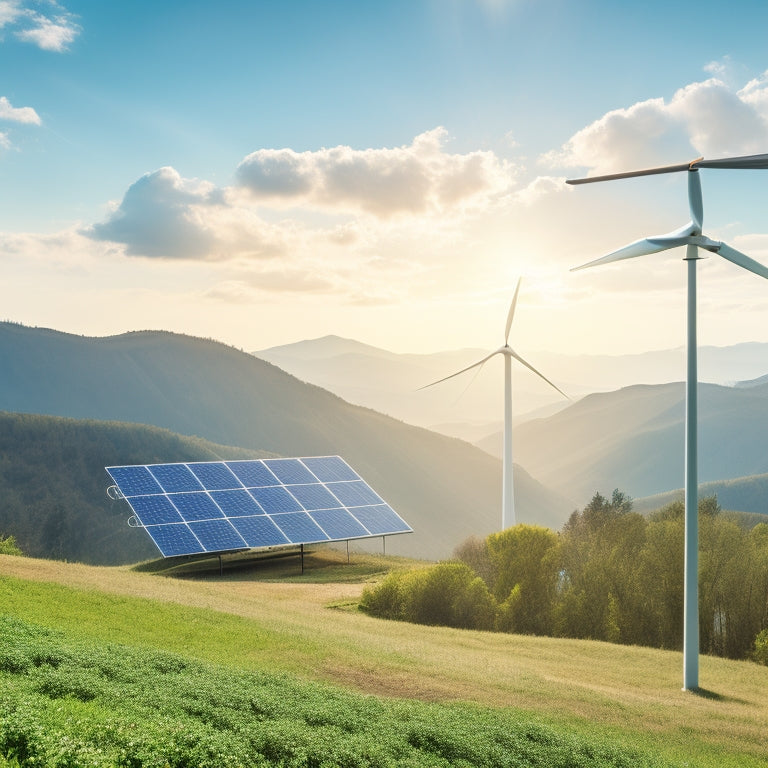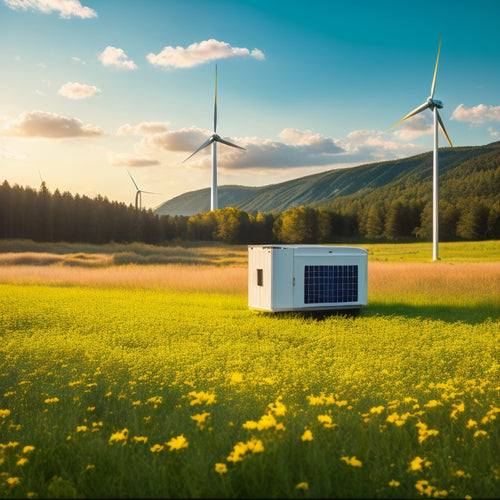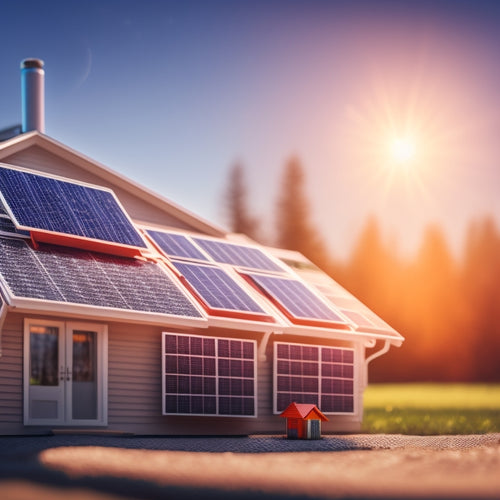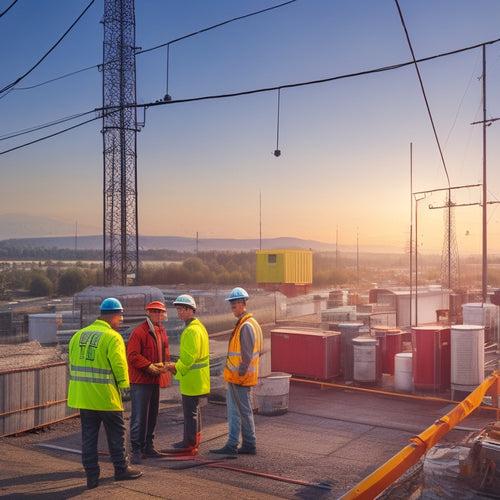
Why Choose High-Efficiency Renewable Energy Panels
Share
You're choosing high-efficiency renewable energy panels because you want to maximize your energy output, minimize your environmental footprint, and enjoy significant long-term savings on your energy bills. Higher efficiency means more power generation per unit area, which translates to increased energy savings over time. By selecting high-efficiency panels, you'll not only reduce your reliance on traditional power sources but also lower your carbon footprint. What's more, you'll benefit from durable and reliable equipment, government incentives, and a considerable return on investment. As you investigate further, you'll uncover the full range of benefits that high-efficiency renewable energy panels have to offer.
Overview
- High-efficiency panels generate more power per unit area, increasing energy independence and reducing reliance on traditional power sources.
- Selecting high-efficiency panels ensures optimal energy utilization, leading to lower energy bills and a reduced carbon footprint.
- High-efficiency panels are built with superior material quality, enhancing durability and long-term performance, even in harsh environmental conditions.
- Government incentives, such as tax credits, improve the financial viability of high-efficiency panels, making clean energy transitions more feasible.
- High-efficiency panels provide considerable returns on investment, with accumulated savings providing significant long-term value and energy independence.
Solar Panel Efficiency Ratings
How efficiently do solar panels convert sunlight into electricity? You're likely curious about the efficiency ratings of these innovative devices.
Solar panel efficiency ratings measure how well a panel converts sunlight into usable energy. Thanks to solar technology advancements, modern panels boast higher efficiency ratings than ever before. High-efficiency silicon solar cells, for instance, have achieved conversion rates over 26% under lab conditions, highlighting superior performance advanced bifacial solar panels.
Panel material innovations have led to significant improvements, with top-tier panels reaching efficiencies of up to 22%. These high-efficiency panels are designed to maximize energy output while minimizing environmental impact.
When selecting a solar panel, look for high-efficiency ratings to guarantee you're getting the most bang for your buck. With the right panel, you can utilize the power of the sun to fuel your pursuit of freedom and independence.
Higher Efficiency Means More Power
As you investigate the benefits of high-efficiency solar panels, it's essential to understand the direct correlation between efficiency and power output. Fundamentally, higher efficiency means more power generation per unit area. This is because high-efficiency panels can convert a larger percentage of sunlight into usable energy, resulting in increased power output.
| Efficiency Rating | Power Output (Watts) |
|---|---|
| 15% | 150 |
| 18% | 180 |
| 20% | 200 |
| 22% | 220 |
This table illustrates the impact of efficiency on power output. As you can see, a higher efficiency rating directly translates to increased power generation, making high-efficiency solar panels an attractive option for those seeking to maximize their energy conversion and achieve greater freedom from traditional power sources.
Environmental Impact of Low Efficiency
While high-efficiency solar panels offer numerous benefits, their low-efficiency counterparts have a significant drawback: a larger environmental footprint.
You'll notice that low-efficiency panels require more material to produce the same amount of energy, leading to increased resource depletion. This, in turn, contributes to a larger carbon footprint, which is detrimental to the environment.
Additionally, the increased material usage results in more waste and pollution during the manufacturing process. The reliance on fossil fuels in rural areas, for instance, can be mitigated by adopting energy storage solutions that optimize solar power for water pumping, ensuring a consistent supply for rural communities.
Energy Savings Over Time
As you consider high-efficiency renewable energy panels, you'll want to calculate the long-term financial benefits.
By installing these panels, you'll lower your energy bills over time, saving you money that would've been spent on traditional power sources. This translates to a significant long-term value, as the initial investment pays for itself and then some.
Additionally, selecting high-quality equipment from reputable suppliers, such as those with UL certifications, guarantees reliability and durability, further enhancing the overall cost-effectiveness of the system.
Lower Your Bills
Regularly, homeowners who invest in high-efficiency renewable energy panels can expect significant reductions in their energy bills over time.
You'll benefit from lower electricity costs, freeing up more money in your budget for the things that matter most.
By utilizing renewable energy, you'll reduce your reliance on the grid and enjoy energy independence.
Plus, government incentives can help offset the initial investment, making the shift to clean energy even more appealing.
With high-efficiency panels, you'll generate more power per hour of sunlight, resulting in greater energy savings over time.
Long-Term Value
You'll likely see considerable returns on your investment in high-efficiency renewable energy panels over the long haul.
While the initial investment might seem steep, it pays off in the long run. With high-efficiency panels, you'll generate more electricity per unit area, reducing your energy bills considerably.
Additionally, government incentives, such as tax credits and rebates, can help offset the upfront cost. As you continue to reap the benefits of renewable energy, your savings will accumulate, providing a substantial return on your investment.
Over time, the energy savings will more than compensate for the initial outlay, giving you long-term value and energy independence.
Durability and Long-Term Performance
When investing in high-efficiency renewable energy panels, one of the primary concerns is their ability to withstand the elements and maintain peak performance over an extended period.
You want to guarantee that your investment will provide a reliable source of clean energy for years to come. High-efficiency panels are built with superior material quality, which enables them to resist corrosion and degradation from environmental factors.
Their weather resistance is also enhanced through advanced coatings and encapsulation techniques. As a result, they can operate at peak levels even in harsh weather conditions, providing you with a consistent and sustainable source of power.
Maximizing Roof Space and Aesthetics
High-efficiency renewable energy panels not only provide long-term performance but also offer a solution to maximize your roof space.
With their sleek and slim design, you can fit more panels on your roof, generating more energy while minimizing visual impact. This design flexibility allows for aesthetic integration, blending seamlessly into your home's design.
You can choose from various panel sizes, shapes, and colors to match your roof's unique features. By optimizing your roof space, you'll increase energy production and reduce your carbon footprint.
Plus, high-efficiency panels are designed to work in harmony with your roof's structure, ensuring a secure and durable installation that will last for years to come.
Frequently Asked Questions
Can I Install High-Efficiency Panels on an Old Roof?
You can install high-efficiency panels on an old roof, but you'll need to assess the roof's condition first; if it's near the end of its lifespan, you may want to contemplate replacing it to avoid additional installation costs.
Do High-Efficiency Panels Work Well in Low-Light Conditions?
You'll be pleased to know that high-efficiency panels are designed to thrive in less-than-ideal conditions; their advanced energy conversion technology guarantees impressive low light performance, so you can still utilize power even on cloudy or gloomy days.
Are High-Efficiency Panels Compatible With Existing Systems?
You'll find high-efficiency panels seamlessly integrate with existing systems, ensuring ideal system compatibility and maximizing energy output, giving you the freedom to utilize renewable energy without compromising your current infrastructure.
Can I Mix High-Efficiency Panels With Standard Panels?
As you weigh the freedom to mix and match, imagine a puzzle with mismatched pieces: high-efficiency panels shine like diamonds, but blending them with standard panels can create a cost comparison conundrum and spark installation challenges.
Are High-Efficiency Panels More Prone to Overheating?
You'll find that high-efficiency panels aren't inherently more prone to overheating, but they do require advanced thermal management to mitigate overheating risks; look for panels with built-in heat sinks or aerodynamic designs to guarantee peak performance.
Ready to Buy
As you gear up to utilize the power of renewable energy, remember that high-efficiency panels are the way to go. It's like having a DeLorean that runs on sunshine, minus the flux capacitor (but with better mileage, of course!). In all seriousness, high-efficiency panels translate to more power, reduced environmental impact, and long-term energy savings. By choosing them, you'll be accelerating your expedition towards a sustainable future. Buckle up and reap the benefits of going green!
Related Posts
-

Sustainable and Eco-Friendly Generators for a Reduced Carbon Footprint
Sustainable and eco-friendly generators are perfect for cutting your carbon footprint and increasing energy efficienc...
-

A Beginner's Guide to Navigating the Solar Investment Tax Credit
You're eligible to claim a significant Solar Investment Tax Credit (ITC) of 30% of total installation costs, but mane...
-

Smart Grid Technology Implementation Challenges
You'll encounter several challenges when implementing smart grid technology, particularly in cost management, scalabi...


